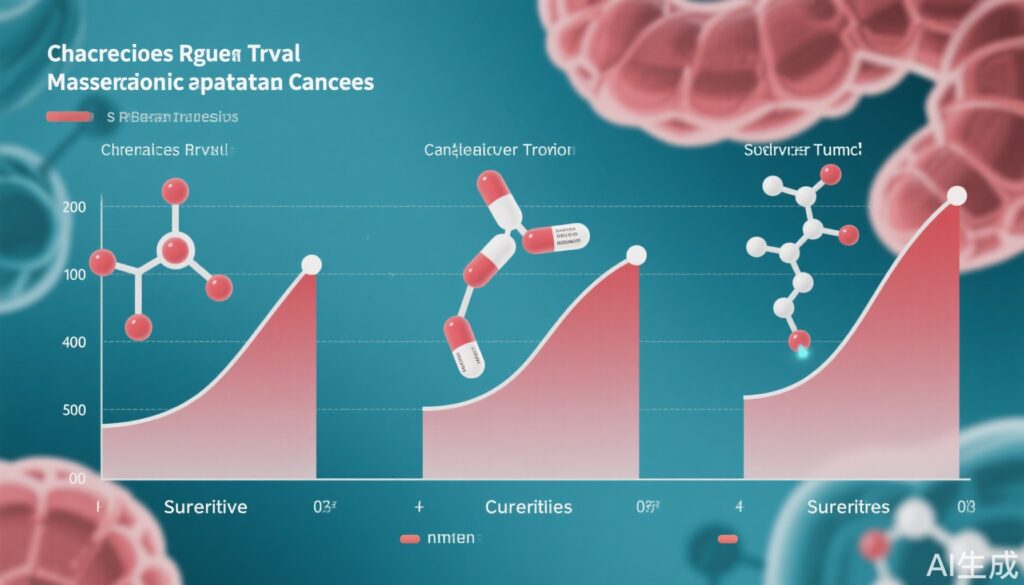Highlights
- Nab-paclitaxel plus gemcitabine demonstrated superior median overall survival (OS) compared to mFOLFIRINOX and S-IROX in Japanese patients with metastatic or recurrent pancreatic cancer.
- No significant differences in progression-free survival (PFS) were observed among the three regimens.
- mFOLFIRINOX and S-IROX were associated with higher rates of gastrointestinal toxicity, while nab-paclitaxel plus gemcitabine predominantly caused neutropenia.
- The GENERATE (JCOG1611) trial establishes nab-paclitaxel plus gemcitabine as the preferred first-line standard for this population.
Clinical Background and Disease Burden
Pancreatic cancer remains one of the deadliest malignancies worldwide, with more than 80% of patients diagnosed at an unresectable or metastatic stage. The five-year overall survival rate for these patients is less than 10%, reflecting both the aggressive biology of the disease and limited therapeutic advances. Systemic chemotherapy remains the backbone of treatment, as immunotherapy and molecularly targeted agents have thus far provided limited benefit in unselected populations. Two regimens—modified FOLFIRINOX (mFOLFIRINOX) and nab-paclitaxel plus gemcitabine—are widely recommended as first-line therapy, yet the optimal choice and patient selection criteria remain debated due to the absence of head-to-head comparative data.
Research Methodology
The GENERATE (JCOG1611) trial, published in the Journal of Clinical Oncology, is a multicenter, randomized, open-label phase II/III study conducted across 45 Japanese centers. The aim was to compare the efficacy and safety of three first-line chemotherapy regimens:
- mFOLFIRINOX (oxaliplatin 85mg/m², irinotecan 150mg/m², leucovorin 200mg/m² on day 1, 5-FU 2400mg/m² continuous infusion over 46 hours, every 2 weeks)
- S-IROX (oxaliplatin 85mg/m² and irinotecan 150mg/m² on day 1, plus oral S-1 80mg/m²/day twice daily on days 1–7, every 2 weeks)
- Nab-paclitaxel plus gemcitabine (nab-paclitaxel 125mg/m² and gemcitabine 1000mg/m² on days 1, 8, 15 of a 4-week cycle)
Eligible patients were aged 20–75, had an ECOG performance status of 0–1, and histologically confirmed metastatic or recurrent pancreatic cancer. Randomization (1:1:1) ensured balanced baseline characteristics. Tumor assessments were performed every 6 weeks using enhanced CT or MRI until disease progression or death. The primary endpoint for phase III was overall survival (OS). Secondary endpoints included progression-free survival (PFS), objective response rate (ORR), adverse events, and relative dose intensity. Pre-planned interim analysis was conducted once 50% of the target sample size was reached, with stopping rules for futility (HR>1.0) or overwhelming efficacy.
Key Findings
Between April 2019 and March 2023, a total of 527 patients were enrolled; 426 were included in the planned interim analysis. Baseline characteristics were well matched across groups (median age 65–67 years; ECOG 0 in ~67%).
At interim analysis, the median OS was:
- Nab-paclitaxel + gemcitabine: 17.1 months
- mFOLFIRINOX: 14.0 months (HR=1.31, 95% CI 0.97–1.77)
- S-IROX: 13.6 months (HR=1.35, 95% CI 1.00–1.82)
Both mFOLFIRINOX and S-IROX failed to demonstrate superiority over nab-paclitaxel plus gemcitabine, with less than 1% predicted probability of eventually showing benefit. Consequently, the trial was stopped early for futility.
Updated OS data at a median follow-up of 10.1 months for the intention-to-treat (ITT) population were consistent:
- Nab-paclitaxel + gemcitabine: 17.0 months
- mFOLFIRINOX: 14.0 months (HR=1.29, 95% CI 0.98–1.70)
- S-IROX: 13.6 months (HR=1.29, 95% CI 0.98–1.70)
PFS was similar across all arms:
- Nab-paclitaxel + gemcitabine: 6.7 months
- mFOLFIRINOX: 5.8 months (HR=1.15, 95% CI 0.91–1.45)
- S-IROX: 6.7 months (HR=1.07, 95% CI 0.84–1.35)
In terms of toxicities, grade 3–4 neutropenia was most common with nab-paclitaxel plus gemcitabine (60.3%), while anorexia and diarrhea occurred more frequently with mFOLFIRINOX and S-IROX. Treatment-related mortality was low and comparable (0.2% for both mFOLFIRINOX and S-IROX).
| Regimen | Median OS (months) | Median PFS (months) | Common Grade 3–4 AEs |
|---|---|---|---|
| Nab-paclitaxel + Gemcitabine | 17.0 | 6.7 | Neutropenia (60.3%) |
| mFOLFIRINOX | 14.0 | 5.8 | Anorexia, Diarrhea |
| S-IROX | 13.6 | 6.7 | Anorexia, Diarrhea |
Mechanistic Insights and Biological Plausibility
Nab-paclitaxel, a nanoparticle albumin-bound formulation of paclitaxel, may enhance drug delivery to tumor stroma-rich pancreatic cancers and facilitate gemcitabine uptake by depleting tumor-associated fibroblasts. The combination demonstrates a complementary cytotoxic profile and manageable safety, which could explain its favorable performance in this population.
Expert Commentary
While prior Western studies established both FOLFIRINOX and nab-paclitaxel plus gemcitabine as standards, the GENERATE trial is the first to directly compare these regimens in a large Asian cohort. The data suggest that nab-paclitaxel plus gemcitabine is better tolerated and more effective for Japanese patients, aligning with real-world practice trends in East Asia. Current NCCN guidelines endorse both regimens, but these results may influence future guideline updates and clinical decision-making, especially for populations with similar genetic, dietary, and toxicity profiles.
Controversies and Limitations
The open-label design and the regional focus on Japanese patients may limit the generalizability to other ethnicities or healthcare systems. Additionally, the early termination of the trial, while methodologically justified, precludes longer-term follow-up data and may limit insights into rare adverse events or late effects. It remains unclear whether these results fully extrapolate to Western populations or to patients with poorer performance status.
Conclusion
The GENERATE (JCOG1611) study provides robust evidence that nab-paclitaxel plus gemcitabine is the superior first-line chemotherapy regimen for metastatic or recurrent pancreatic cancer in Japanese patients, offering both longer OS and a more favorable toxicity profile compared to mFOLFIRINOX or S-IROX. While PFS remains similar across regimens, the improved tolerability and survival advantage position nab-paclitaxel plus gemcitabine as the new reference standard for this population. Future research should focus on integrating biomarker-driven strategies and novel therapeutics beyond chemotherapy.
References
1. Ohba A, Ozaka M, Mizusawa J, et al. Modified Fluorouracil, Leucovorin, Irinotecan, and Oxaliplatin or S-1, Irinotecan, and Oxaliplatin Versus Nab-Paclitaxel + Gemcitabine in Metastatic or Recurrent Pancreatic Cancer (GENERATE, JCOG1611): A Randomized, Open-Label, Phase II/III Trial. J Clin Oncol. Published online July 28, 2025. doi:10.1200/JCO.24.00936
2. Conroy T, et al. FOLFIRINOX versus gemcitabine for metastatic pancreatic cancer. N Engl J Med. 2011;364(19):1817-1825.
3. Von Hoff DD, et al. Increased survival in pancreatic cancer with nab-paclitaxel plus gemcitabine. N Engl J Med. 2013;369(18):1691-1703.



